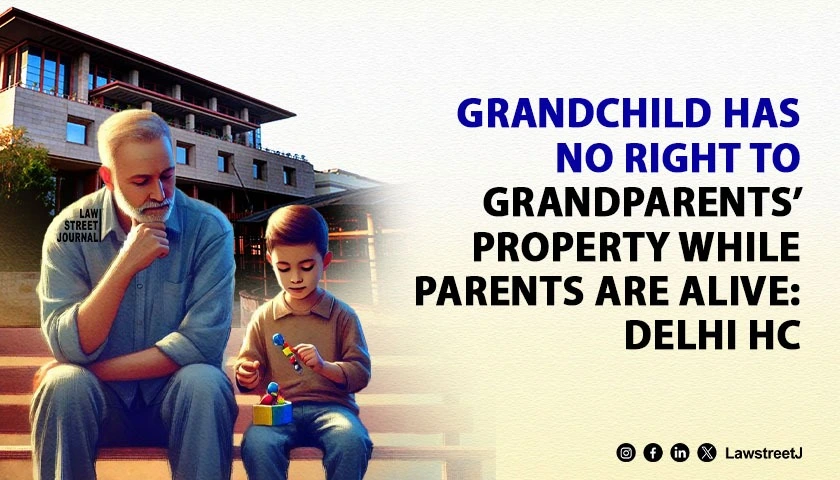New Delhi: The Delhi High Court has rejected a partition suit filed by a daughter seeking a share in her paternal grandfather’s property, ruling that properties inherited under the Hindu Succession Act, 1956, do not retain their ancestral character and cannot be claimed by grandchildren whose parents are alive.
Justice Purushaindra Kumar Kaurav delivered the judgment on September 9, 2025, in a case that highlights the significant changes brought about by the Hindu Succession Act, 1956, in traditional Hindu inheritance laws.
Advocate Vineet Jindal, appearing for the defendants, said that this judgment is important as it clears a widespread misconception among the public that grandchildren automatically acquire rights over their grandparents’ property even when their own parents (the Class-I heirs) are alive.
The court addressed a suit filed by Kritika Jain against her father, Rakesh Jain, and paternal aunt, Neena Jain, seeking partition of property C4F/196, Pankha Road, Janakpuri, New Delhi. Jain claimed entitlement to a one-fourth share in the property originally purchased by her paternal grandfather, late Pawan Kumar Jain, in 1972–73.
The plaintiff’s case rested on the premise that the property was ancestral in nature. She alleged that when she requested partition, the defendants avoided her demands and attempted to create third-party rights to deprive her of her rightful share. Her grandfather had died intestate on June 26, 1994, followed by her grandmother on January 19, 2023.
The defendants filed an application under Order VII Rule 11(a) of the Code of Civil Procedure seeking rejection of the plaint, arguing that no cause of action was disclosed. They contended that upon the grandparents’ deaths, the property devolved solely on them under Section 8 of the Hindu Succession Act, 1956, excluding the plaintiff from any rights.
Justice Kaurav observed that under pre-1956 Mitakshara Hindu law, property inherited from father, father’s father, or father’s father’s father would be ancestral property, with sons acquiring rights by birth. However, the Hindu Succession Act brought “drastic changes” to intestate succession laws among Hindus.
The court emphasized that Section 8 of the Hindu Succession Act provides clear succession rules for male Hindus dying intestate, with property devolving first upon Class I heirs as specified in the Schedule. These include son, daughter, widow, and mother, but notably exclude grandchildren whose parents are alive at the time of the deceased’s death.
Citing the Supreme Court’s landmark judgment in Yudhister v. Ashok Kumar, Justice Kaurav noted: “Property inherited by a person under Section 8 of the HSA is taken by him in his individual capacity, and not as the karta of his family.” The court explained that post-1956, inherited property becomes absolute or individual property, not ancestral property.
The court also referred to the Supreme Court’s observation in Trijugi Narain v. Sankoo that “any property inherited by an heir vide intestate succession in the event of death occurring after 17-6-1956 is absolute or individual property and not ancestral property.”
Justice Kaurav further made observations on the succession chain, noting that when Pawan Kumar Jain died in 1994, the property devolved solely on his Class I heirs — his wife, Sudarshan Jain, and children, Rakesh Jain and Neena Jain. The plaintiff, being a grandchild with her father alive, was not entitled to inherit. Subsequently, when Sudarshan Jain died in 2023, her share devolved under Section 15(1)(a) solely on her children.
The court relied on its earlier decision in Surender Kumar v. Dhani Ram, which established that inheritance after 1956 creates self-acquired property in successors’ hands, not HUF property, even when inheriting ancestral property. The only exceptions would be if the property existed as HUF before 1956 and continued in that status, or if individual property was thrown into a common hotchpotch to create an HUF.
On the concept of cause of action, Justice Kaurav cited the Supreme Court’s definition in Oil and Natural Gas Commission v. Utpal Kumar Basu as “that bundle of facts which the petitioner must prove, if traversed, to entitle him to a judgment in his favour by the Court.”
The court concluded that since the plaintiff had no legal right over the suit property under Section 8 of the Hindu Succession Act, the plaint disclosed no cause of action. Justice Kaurav observed: “There arises no question of partition of the suit property or any declaration qua the same or any prohibition upon the defendants, at the instance of the plaintiff, without the existence of a valid right therein.”
Consequently, the application under Order VII Rule 11(a) was allowed, and the plaint was rejected along with all pending applications, with no order as to costs.
Case Title: Kritika Jain vs. Rakesh Jain & Anr.



![Delhi High Court Sets Aside Arbitral Tribunal's Award Against NHAI in Highway Project Delay Case [Read Judgment]](/secure/uploads/2023/07/lj_9605_23374c2e-392c-4491-a2fe-f2f12fc5272f.jpg)
![Delhi Court Rejects Stay Request in Defamation Case Against Rajasthan CM Ashok Gehlot [Read Order]](/secure/uploads/2023/08/lj_5208_80de1ddc-d76a-4f7f-b180-408e3ae14fb4.jpg)





